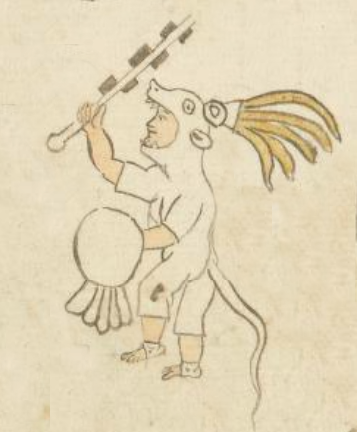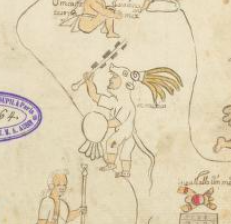Mexica (Azca15)
This iconographic example shows a Mexicatl (person of an ethnicity that became associated with Mexico City). This person is male, and he is shown in profile, facing left. He is dressed and equipped for war. An animal skin covers most of his body, except for his lower legs and forearms. The animal skin still has its tail and its head. The face of this warrior peers out through the open mouth of the animal’s head. Five gold-color feathers are attached to the top of the animal’s head in the form of a headdress. In his right hand, raised up, this man holds a wooden club embedded with six black obsidian blades. This is likely called a macuahuitl. In his left hand he holds a round shield that has feathers hanging off the bottom. He has sandals tied on his feet. His skin is painted a flesh-tone. The skin of the animal and the weapons are left a white or natural color.
Stephanie Wood
The gloss refers to the Mexica (plural), even though just one person accompanies the gloss. This detail comes from a scene relating to a historic migration and the settling of various towns on the way to eventually founding Mexico-Tenochtitlan. The migration involves conflict. This manuscript gives credit to the Mexica for the establishment of these towns en route.
Stephanie Wood
in mexica
in Mexica
Stephanie Wood
post-1550, possibly from the early seventeenth century.
Jeff Haskett-Wood
migración, pieles, animales, guerreros, javelinas, tocado, penacho, plumas, etnicidades

Mexica, an ethnic designation for the people of Mexico City, https://nahuatl.wired-humanities.org/content/mexica
Mexica
Stephanie Wood
The Codex Azcatitlan is also known as the Histoire mexicaine, [Manuscrit] Mexicain 59–64. It is housed in the Bibliothèque Nationale de France, and hosted on line by the World Digital Library and the Library of Congress, which is “unaware of any copyright or other restrictions in the World Digital Library Collection.”
https://www.loc.gov/resource/gdcwdl.wdl_15280/?sp=15&st=image
The Library of Congress is “unaware of any copyright or other restrictions in the World Digital Library Collection.” But please cite Bibliothèque Nationale de France and this Visual Lexicon of Aztec Hieroglyphs.



